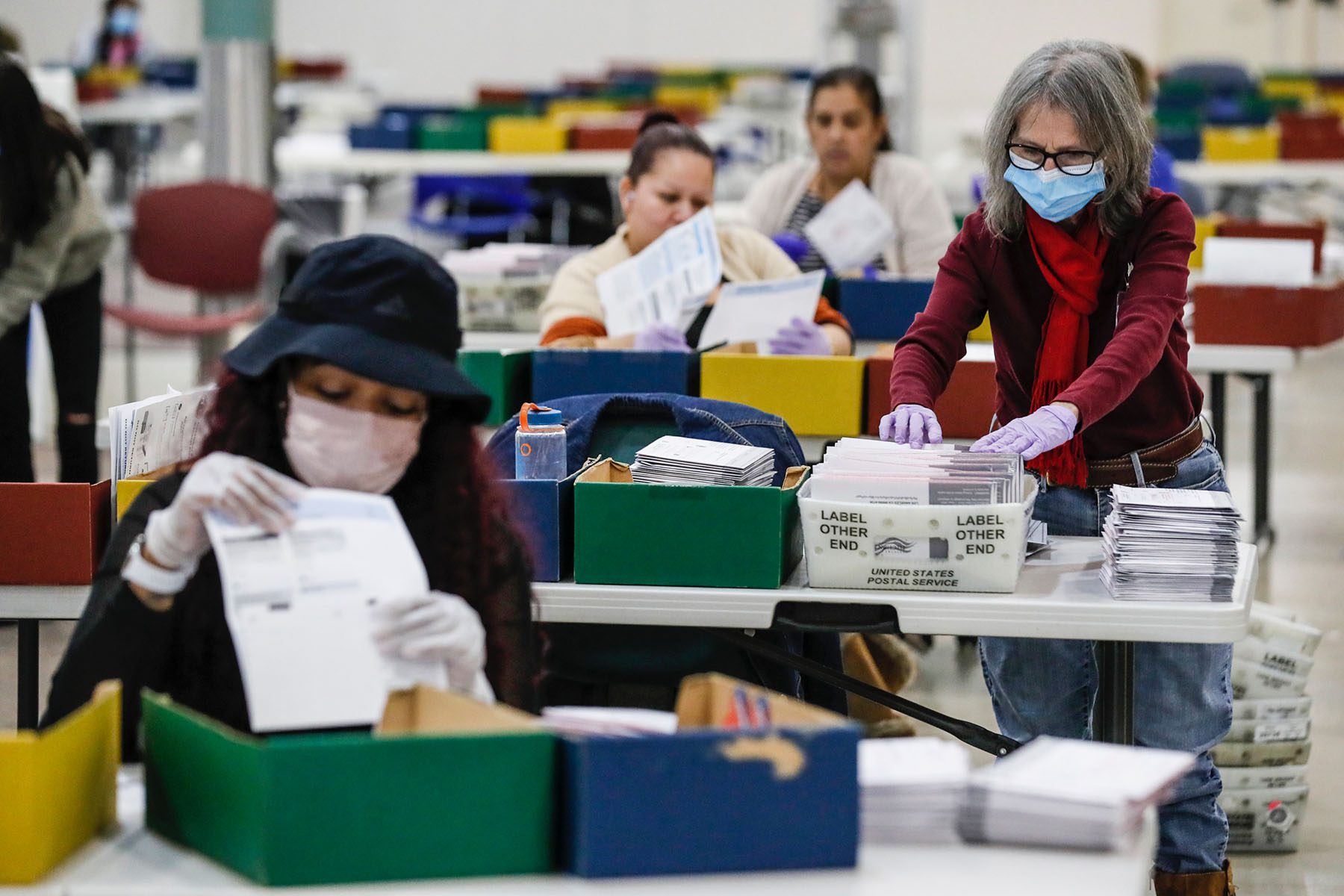We’re answering the “how” and “why” of politics news. Subscribe to our daily newsletter.
After lies about the 2020 presidential election led to threats against election workers and instances of actual political violence, all eyes were on how that would affect the 2022 midterms. While many breathed a sigh of relief that election administration went mostly as planned, the attention and pressure still took a toll. Now, some states are looking to add policies that would address potential future threats for election workers.
It’s a continuation of legislative activity from 2022, but with a new urgency ahead of the 2024 presidential race. Federal funding was approved last year to help boost security, but some voting rights advocates say it wasn’t enough and more must be done to ensure the protection of election workers, a women-led workforce that will remain crucial to the sustainability of elections.
“Being able to sufficiently fund elections plays a tremendous role in protecting democracy,” said Jena Griswold, the Democratic Colorado secretary of state. “As we see insider attacks spread across the country and threats to election workers, it requires upgrade of physical security and teams to be able to assess and respond to situations.”
Election workers have increasingly warned of threats of violence and harassment due in part to conspiracies promoted by former President Donald Trump — who has said he’s running again — following his 2020 loss. His supporters, some of whom then ran for offices with power over elections, have continued to push those unfounded claims. Many of the election-denying candidates lost their races in November, a sign that democracy was a top issue for voters ahead of the midterms.
But while election workers mostly powered through a smooth process in November, the threat of political violence continues, according to election officials and voting rights advocates. Ramping up protections for election workers will be critical this year for legislatures, said Sam Oliker-Friedland, executive director of the Institute for Responsive Government, a group that offers recommendations on voting policy and other civic engagement initiatives. He believes that can include state funding to beef up security infrastructure.
“This is a workforce that’s one of the most sort of underfunded, under-resourced, overworked public service jobs that exists in the United States,” Oliker-Friedland said. “And it’s one that’s primarily women. I don’t think that’s an accident.”
Colorado and Oregon enacted laws last year that add new criminal penalties against people accused of threatening election workers. A new California law keeps election workers’ home addresses private under a confidentiality program. The Voting Rights Lab, a nonpartisan group that tracks voting legislation, estimates 19 states introduced bills last year to protect election officials. Six of those states successfully passed new laws.
At least eight states have introduced a minimum of 11 bills that would provide similar protections for election workers, according to the Voting Rights Lab, and more are possible.
In Minnesota, lawmakers have announced a slate of election-related proposals, including plans aimed at punishing intimidation of election workers. In Texas, a bill would create several new criminal offenses for conduct against election officials and protect their personal information. And in Montana and Indiana, bills have been introduced that would increase punishment for targeting an election worker.
Most of the related legislation moving through statehouses have been led by Democrats. Whether these bills make it into law is unclear, but some have bipartisan support. In Missouri, a Republican has filed a bill that would create a felony criminal offense if someone takes one of several actions against an election official, including threatening or causing harm to the official or their family. In New Jersey, a pair of bills that would protect election workers’ personal information is sponsored by Republicans. Republicans last year authored bills in New Hampshire and Oregon, noted Liz Avore, Voting Rights Lab’s vice president of policy and law.
“We’re seeing legislation that’s been introduced by both Democrats and Republicans,” she noted. “In some ways, this is a kind of call to action that is bipartisan.”
Jocelyn Benson, the Democratic Michigan secretary of state who has been a prominent voice for fair elections, said it’s been heartening to see new secretaries of state announce plans to keep election workers safe. Earlier this month, she and Michigan lawmakers announced support for a bill that would protect election workers by increasing penalties for threatening that particular group. Among the proposals are security funding for local clerks.
“We’re nowhere near where we need to be to protect our democracy or to protect our election workers,” Benson said. “My job, and the job of all of us in this space, is to keep fighting for it, and we will, and to use everything on the table to make smart, informed decisions to keep moving the ball forward where we can.”
Oliker-Friedland said more funding for election materials and safety measures can go a long way in also protecting workers. Many offices are often funded through local and state taxes.
“Just making election officials’ jobs easier actually is a pro for voter access in and of itself,” he said. “And I think people forget that sometimes.”

In Colorado, Griswold helped support legislation signed into law last year that establishes election officials and workers as a protected class against doxxing, or having their personal information published online for the purpose of threatening them or their family. Another provision prohibits intimidating, threatening or coercing an election official while they are performing official duties or retaliating against them for performing their official duties. Both carry penalties.
“Election workers in the state of Colorado have been facing what many election workers have faced across the nation,” Griswold said. “… We’re doing everything that we have at our disposal to make sure that we’re protecting Colorado’s elections.”
But whether the laws are all working as intended is still unclear, in part because not a lot of time has passed since they were implemented.
In Washington state, a new law updated the state’s cyberstalking and cyber harassment law and made it a felony to target election workers online. Shortly after the state’s primary last August, an election worker in Jefferson County, in the western part of the state, received an email with a warning: “Be careful … your life might depend on it. The truth will prevail.”
The worker, who spoke with The 19th on the condition of anonymity because of fear of their safety, filed a restraining order against the person who sent the email. A court granted the request, which will be in effect for five years, including for the 2024 presidential election.
But the Jefferson County prosecutor’s office said unless there is new evidence, it does not intend to file charges in this case. James M. Kennedy, the Jefferson County prosecuting attorney, said Washington state law requires that threats be more specific than the language in the email to obtain a conviction. He said he sympathized with the election worker.
“We absolutely agree that the conduct committed by this suspect was totally inappropriate,” Kennedy said in an email. “However we did not think it quite crossed the threshold into criminal.”
The election worker said the threat made them question whether they want to keep working on elections.
“I actually sat down with my parents and my spouse and said, ‘Is this something that I want to continue on as far as a career path? Is this really something that I want to do? And that my family wants to be subjected to too?’” they said.
Even as legislators of both parties look to protect election workers, some Republican legislators are proposing bills that would limit how administrators do parts of their jobs. Many have been filed as a response to unfounded concern about election fraud. While Texas is considering some protections, a Republican-backed bill moving through the statehouse — one of more than a dozen voting-related bills this year — would expand the Texas attorney general’s power to prosecute election crimes. Voting rights advocates worry it will target election administrators.
“We’re seeing a divide develop across the country, where states are either acting to protect their election officials or they’re acting to attack them,” Avore said. “We want you to pay attention to what your state is doing, because election professionals are the ones who we depend on to run our elections, to hold our democracy — their protection and their ability to do their job is incredibly important.”
Griswold said Republican lawmakers who have introduced such legislation are creating “a culture of fear” for election workers just trying to do their jobs.
“It’s a shame to see states pursue those types of actions, especially given what Republican and Democratic election workers have had to face in the last three years,” she said.
Oliker-Friedland said states that make other changes to election rules, like a new photo ID requirement in Ohio, also “have intense implications for election officials’ workload, both actually how they plan for the election and how they communicate to voters.”
What states do in the months ahead will play a part in how election workers view their work.
Benson said she lives “in a constant state of concern and vulnerability,” in part because she continues to receive threats. At least one threat came just days after President Joe Biden awarded her with a presidential citizens medal for her work in supporting democracy, handling pressure from people who sought to overturn the 2020 election results.
“We’re not out of the woods yet in terms of people being activated by misinformation to try to do harm to election workers,” she said. “It has been gratifying to connect with others who have dealt with this. That is where I find my strength.”







